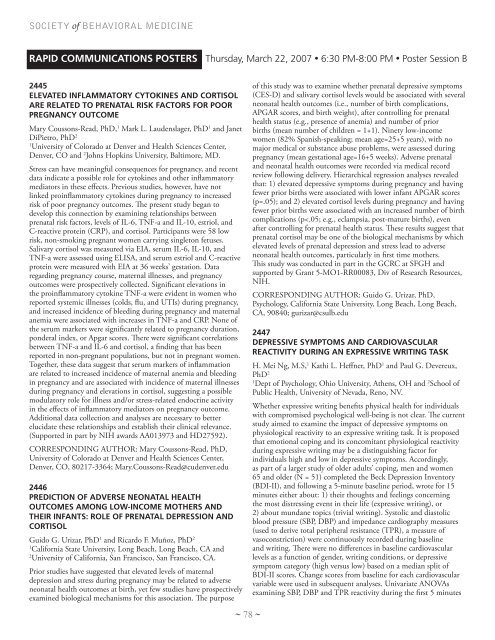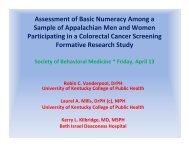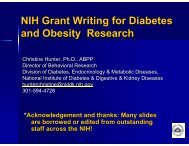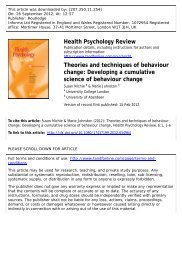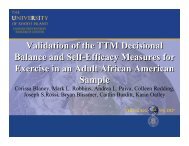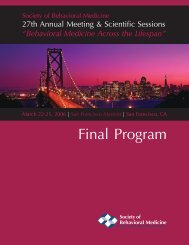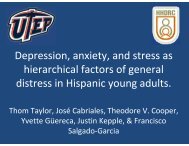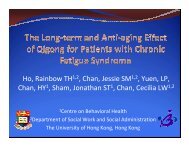2007 Final Program - Society of Behavioral Medicine
2007 Final Program - Society of Behavioral Medicine
2007 Final Program - Society of Behavioral Medicine
You also want an ePaper? Increase the reach of your titles
YUMPU automatically turns print PDFs into web optimized ePapers that Google loves.
SOCIETY <strong>of</strong> BEHAVIORAL MEDICINE<br />
Rapid Communications Posters Thursday, March 22, <strong>2007</strong> • 6:30 PM-8:00 PM • Poster Session B<br />
2445<br />
ELEVATED INFLAMMATORY CYTOKINES AND CORTISOL<br />
ARE RELATED TO PRENATAL RISK FACTORS FOR POOR<br />
PREGNANCY OUTCOME<br />
Mary Coussons-Read, PhD, 1 Mark L. Laudenslager, PhD 1 and Janet<br />
DiPietro, PhD 2<br />
1<br />
University <strong>of</strong> Colorado at Denver and Health Sciences Center,<br />
Denver, CO and 2 Johns Hopkins University, Baltimore, MD.<br />
Stress can have meaningful consequences for pregnancy, and recent<br />
data indicate a possible role for cytokines and other inflammatory<br />
mediators in these effects. Previous studies, however, have not<br />
linked proinflammatory cytokines during pregnancy to increased<br />
risk <strong>of</strong> poor pregnancy outcomes. The present study began to<br />
develop this connection by examining relationships between<br />
prenatal risk factors, levels <strong>of</strong> IL-6, TNF-a and IL-10, estriol, and<br />
C-reactive protein (CRP), and cortisol. Participants were 58 low<br />
risk, non-smoking pregnant women carrying singleton fetuses.<br />
Salivary cortisol was measured via EIA, serum IL-6, IL-10, and<br />
TNF-a were assessed using ELISA, and serum estriol and C-reactive<br />
protein were measured with EIA at 36 weeks’ gestation. Data<br />
regarding pregnancy course, maternal illnesses, and pregnancy<br />
outcomes were prospectively collected. Significant elevations in<br />
the proinflammatory cytokine TNF-a were evident in women who<br />
reported systemic illnesses (colds, flu, and UTIs) during pregnancy,<br />
and increased incidence <strong>of</strong> bleeding during pregnancy and maternal<br />
anemia were associated with increases in TNF-a and CRP. None <strong>of</strong><br />
the serum markers were significantly related to pregnancy duration,<br />
ponderal index, or Apgar scores. There were significant correlations<br />
between TNF-a and IL-6 and cortisol, a finding that has been<br />
reported in non-pregnant populations, but not in pregnant women.<br />
Together, these data suggest that serum markers <strong>of</strong> inflammation<br />
are related to increased incidence <strong>of</strong> maternal anemia and bleeding<br />
in pregnancy and are associated with incidence <strong>of</strong> maternal illnesses<br />
during pregnancy and elevations in cortisol, suggesting a possible<br />
modulatory role for illness and/or stress-related endocrine activity<br />
in the effects <strong>of</strong> inflammatory mediators on pregnancy outcome.<br />
Additional data collection and analyses are necessary to better<br />
elucidate these relationships and establish their clinical relevance.<br />
(Supported in part by NIH awards AA013973 and HD27592).<br />
CORRESPONDING AUTHOR: Mary Coussons-Read, PhD,<br />
University <strong>of</strong> Colorado at Denver and Health Sciences Center,<br />
Denver, CO, 80217-3364; Mary.Coussons-Read@cudenver.edu<br />
2446<br />
PREDICTION OF ADVERSE NEONATAL HEALTH<br />
OUTCOMES AMONG LOW-INCOME MOTHERS AND<br />
THEIR INFANTS: ROLE OF PRENATAL DEPRESSION AND<br />
CORTISOL<br />
Guido G. Urizar, PhD 1 and Ricardo F. Muñoz, PhD 2<br />
1<br />
California State University, Long Beach, Long Beach, CA and<br />
2<br />
University <strong>of</strong> California, San Francisco, San Francisco, CA.<br />
Prior studies have suggested that elevated levels <strong>of</strong> maternal<br />
depression and stress during pregnancy may be related to adverse<br />
neonatal health outcomes at birth, yet few studies have prospectively<br />
examined biological mechanisms for this association. The purpose<br />
~ 78 ~<br />
<strong>of</strong> this study was to examine whether prenatal depressive symptoms<br />
(CES-D) and salivary cortisol levels would be associated with several<br />
neonatal health outcomes (i.e., number <strong>of</strong> birth complications,<br />
APGAR scores, and birth weight), after controlling for prenatal<br />
health status (e.g., presence <strong>of</strong> anemia) and number <strong>of</strong> prior<br />
births (mean number <strong>of</strong> children = 1+1). Ninety low-income<br />
women (82% Spanish-speaking; mean age=25+5 years), with no<br />
major medical or substance abuse problems, were assessed during<br />
pregnancy (mean gestational age=16+5 weeks). Adverse prenatal<br />
and neonatal health outcomes were recorded via medical record<br />
review following delivery. Hierarchical regression analyses revealed<br />
that: 1) elevated depressive symptoms during pregnancy and having<br />
fewer prior births were associated with lower infant APGAR scores<br />
(p=.05); and 2) elevated cortisol levels during pregnancy and having<br />
fewer prior births were associated with an increased number <strong>of</strong> birth<br />
complications (p


